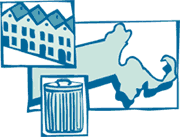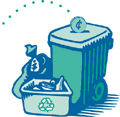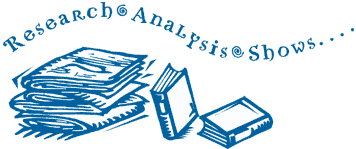PAYT Bulletin: Summer 2000
The PAYT Bulletin is designed to help solid waste planners and others get the latest pay-as-you-throw news and events. Use the links below to read articles from the Summer 2000 issue. To review other issues of the Bulletin, use the links on the right side of this page.Other Issues
- Could PAYT Offer Hope For New York City's Recycling Program? (Winter 2003)
- PAYT Helps Cities Protect Climate (Summer 2002)
- Large Cities and PAYT (Winter 2002)
- Bigger, Older, Wiser: (Summer 2001)
- Maine Turns to PAYT (Spring 2001)
- State and City Profiles (Summer 2000)
- PAYT From Sea to Shining Sea (Winter 2000)
- PAYT Bulletin Archives
![]()
- Massachusetts Makes PAYT a Priority
- More PAYT Superstars
- Study Recommends Statewide PAYT for Massachusetts
- Economic Incentives Work
Massachusetts Makes PAYT a Priority
For years, the West Coast has been the PAYT leader, but recently New England has started gaining ground. Nowhere is the trend more evident than in the Commonwealth of Massachusetts. With more than 95 communities with PAYT programs, including more than 30 established in the past 5 years, Massachusetts has proven itself a leader in providing its towns and cities with the resources they need to implement unit-based pricing.
The Workshop Way 
In a more targeted effort to encourage communities to switch to
PAYT, Massachusetts Department of Environmental Protection (DEP)
began offering PAYT workshops in 1995. DEP holds four half-day workshops
a year in the southeastern, northeastern, central, and western regions
of the state. DEP targets Board of Selectmen members, department
of public works directors, recycling staff, advisory committee members,
and any other interested parties. The workshops include discussions
on full cost accounting and setting rates, as well as roundtable
sessions to address specific issues participants may have. In 2000,
DEP hopes to hold a workshop covering PAYT strategies for municipalities
with populations of 200,000 and more.
Give Them an Incentive
As landfills began reaching capacity and new ones were prohibited,
Massachusetts, like many other states, needed to find a way to encourage
source reduction and recycling. In 1995, the Massachusetts DEP began
the Municipal Recycling Incentive Program (MRIP), which provides
performance-based grants to municipalities. The program, which is
designed to increase recycling and stimulate demand for recycled
products, awards $8 per ton to curbside recycling programs and $4
per ton for drop-off programs. To participate in the program, communities
must meet a set of minimum requirements and elective criteria covering
recycling participation, access to recycling and composting programs,
and purchase of recycled-content products. If a municipality has
a unit-based pricing program, however, it is only required to meet
the buy recycled criteria.
Success Speaks for Itself
Frequently, the best way to spread the word about the benefits
of PAYT is to let the program speak for itself. Massachusetts has
noticed a "cluster effect" often occurs soon after one community
implements a PAYT program. In southeastern Massachusetts, Seekonk
switched to a unit pricing system in 1992. In the course of 8 years,
seven surrounding communities also launched PAYT programs, and two
more are imminent. 
"People see the results and think, 'If they could do that there, why can't we do it here?'" relates Joseph Lambert, recycling and solid waste planner at Massachusetts DEP. "When a dialogue on PAYT starts on a local and personal level, that can be the best outreach strategy there is." Massachusetts has found the cluster effect can even span state borders. Communities in Rhode Island and New Hampshire have begun PAYT programs after adjacent Massachusetts communities made the switch.
Is It Really Successful?
Is PAYT really working in Massachusetts? The answer is a resounding "yes!" From fiscal year 1999 to fiscal year 2000, North Attleborough decreased its tonnage disposed by 44 percent, Royalston by 42 percent, and Needham by 41 percent. Recycling rates increased significantly in PAYT communities listed in the table below.
| Community | Recycling Rate Before PAYT (%) | Recycling Rate After 1 Year (%) |
|---|---|---|
| Lakeville | 24 | 54 |
| Merrimac | 14 | 37 |
| Taunton | 25 | 34 |
| Plainville | 20 | 29 |
More PAYT Superstars
PAYT is everywhere-the East Coast, West Coast, and all points in between! Following are summaries of a few successful PAYT programs and the issues they have faced.
- Berkeley, California-Continuing to Improve
- Making It Better in Fort Collins
- Keeping It Simple Is the Key to Success
- Education Encourages PAYT in Wilmington
- Pennsylvania Town Demonstrates PAYT Concept
Berkeley, California-Continuing to Improve>
 Berkeley,
California (population 105,000), is no stranger to PAYT, enjoying
its benefits since the 1970s. These days, Berkeley is working to improve
its PAYT program by moving from an annual billing cycle, included
in citizens' tax bills, to a quarterly waste collection bill. This
billing shift will allow citizens to more clearly see the connection
between the amount they pay for waste collection and the amount of
waste collected each quarter. Another future improvement will offer
lower rates to households that source separate their waste.
Berkeley,
California (population 105,000), is no stranger to PAYT, enjoying
its benefits since the 1970s. These days, Berkeley is working to improve
its PAYT program by moving from an annual billing cycle, included
in citizens' tax bills, to a quarterly waste collection bill. This
billing shift will allow citizens to more clearly see the connection
between the amount they pay for waste collection and the amount of
waste collected each quarter. Another future improvement will offer
lower rates to households that source separate their waste.
Under a variable rate system, Berkeley's citizens pay about $6.50
for a 13-gallon container, $15 for a 32-gallon container, $30 for
a 64-gallon container, or $45 for a 96-gallon container, which can
be collected as often as three times a week. Berkeley's program
also includes recycling collection once a week and yard waste collection
twice a week. For more information on Berkeley's PAYT program, contact
Tanya Levy at 510 644-8891, Ext. 238.
Making It Better in Fort Collins
 A PAYT program helped a Colorado city boost an already impressive
recycling rate. In the 3 years following Fort Collins' (population
114,000) switch to PAYT in 1996, its recycling participation rate
jumped from 60 to 83 percent. Adding to its success, Fort Collins
decreased waste collection by approximately 8,000 tons from 1995 to
1999, even though the city is experiencing an annual 4 percent growth
in population.
A PAYT program helped a Colorado city boost an already impressive
recycling rate. In the 3 years following Fort Collins' (population
114,000) switch to PAYT in 1996, its recycling participation rate
jumped from 60 to 83 percent. Adding to its success, Fort Collins
decreased waste collection by approximately 8,000 tons from 1995 to
1999, even though the city is experiencing an annual 4 percent growth
in population.
Households in Fort Collins choose from among six waste collection haulers, who each offer a different type of service. In the past, due to the competitive nature of the market, haulers were not enforcing compliance with PAYT for fear of losing customers. If a customer, for example, left out an extra bag or can without paying for it, haulers were likely to collect it anyway. To combat this problem, the city recently amended the PAYT ordinance to state that the city will litigate any hauler operating out of compliance. Haulers now have a disincentive to collect extra trash set out by their customers. For more information on Fort Collins' PAYT program, contact Susie Gordon at 970 221-6265.
Keeping It Simple Is the Key to Success
 The National Recycling Coalition recently honored Forest, Ohio (population
1,600), for its rural recycling program that increased recycling by
350 percent and decreased solid waste by 45 percent. The city started
a multi-tiered PAYT program in October 1998 to counteract the rising
costs of solid waste management, and the program has been a big success.
Keeping the program simple and educating the community prior to its
inception were the keys to successful implementation. Every household
pays $10 per month and receives two 30-gallon bags each week. Each
additional bag collected requires a $1 sticker. Before PAYT, the city
did not have curbside recycling, and its recycling rate was less than
10 percent. For more information, contact Charles Brunkhardt at 419
273-2500.
The National Recycling Coalition recently honored Forest, Ohio (population
1,600), for its rural recycling program that increased recycling by
350 percent and decreased solid waste by 45 percent. The city started
a multi-tiered PAYT program in October 1998 to counteract the rising
costs of solid waste management, and the program has been a big success.
Keeping the program simple and educating the community prior to its
inception were the keys to successful implementation. Every household
pays $10 per month and receives two 30-gallon bags each week. Each
additional bag collected requires a $1 sticker. Before PAYT, the city
did not have curbside recycling, and its recycling rate was less than
10 percent. For more information, contact Charles Brunkhardt at 419
273-2500.Education Encourages PAYT in Wilmington
Today, more than 21,000 households in the Wilmington area take advantage of the PAYT program. Under a variable rate billing system, citizens use either 90-gallon or 40-gallon roll-out carts for weekly waste collection. For larger households that produce more waste, biweekly pickup or individually purchased stickers for occasional overflow are available.
Wilmington's adoption of PAYT prompted a 10 percent increase in its recycling rate and a 40 percent increase in its yard debris collection rate. Getting the word out about PAYT allows the city to successfully support this equitable, economical, and environmentally beneficial waste collection program. For more information, contact Bill Reed at 910 341-7875.
Pennsylvania Town Demonstrates PAYT
 There's an obvious reason the town of Reading, Pennsylvania (population
78,000), can claim the highest curbside recycling rate in the state,
collecting more than 360 tons of recyclables each year. In Reading,
individual citizens, not the town, are responsible for having their
trash picked up. Instead of paying for waste collection through
property taxes or a utilities bill, residents of Reading hire their
choice of several private haulers that service the town. As a result,
citizens are more directly aware of garbage collection costs, creating
a huge incentive to reduce waste. Although illegal dumping has been
an issue at times, the residents of Reading are clearly more likely
to be vigilant about recycling, which is offered as a free service.
The PAYT concept comes through loud and clear-if people have to
pay to get rid of their garbage, recycling will increase. For more
information on Reading's PAYT program, contact Jane Meeks at 610
655-6278.
There's an obvious reason the town of Reading, Pennsylvania (population
78,000), can claim the highest curbside recycling rate in the state,
collecting more than 360 tons of recyclables each year. In Reading,
individual citizens, not the town, are responsible for having their
trash picked up. Instead of paying for waste collection through
property taxes or a utilities bill, residents of Reading hire their
choice of several private haulers that service the town. As a result,
citizens are more directly aware of garbage collection costs, creating
a huge incentive to reduce waste. Although illegal dumping has been
an issue at times, the residents of Reading are clearly more likely
to be vigilant about recycling, which is offered as a free service.
The PAYT concept comes through loud and clear-if people have to
pay to get rid of their garbage, recycling will increase. For more
information on Reading's PAYT program, contact Jane Meeks at 610
655-6278.
Study Recommends Statewide PAYT for Massachusetts
A recent report submitted to the Massachusetts Department of Environmental Protection (DEP) recommends mandatory statewide PAYT pricing for solid waste. Source Reduction in Massachusetts analyzes annual waste reduction and investigates potential areas for expanding source reduction throughout the state. In addition to implementing PAYT, the study recommends that Massachusetts set source reduction goals and develop a program targeting waste reduction in the commercial sector. This report estimates that with mandatory PAYT, source reduction could increase by almost 500,000 tons and recycling by 350,000 tons. For more information, contact Peter Allison at the Massachusetts DEP at 617 292-5980 or peter.allison@state.ma.us.

Stay Tuned for More on PAYT
Two standard PAYT practices were lauded in the September 1999 issue of The Monthly Uneconomist. The journal cites a study that found that waste diversion increases when customers pay at least as much for additional cans of garbage collected as they do for the first can of trash. Providing curbside recycling and yard debris collection for no additional charge are also shown to be successful at reducing waste.
The study found that these economic incentives can increase diversion
rates by 25 percent and influence positive community change in waste
disposal practices. For more information, contact Jeff Morris at
jeff.morris@zerowaste.com
or www.zerowaste.com ![]() using the subscriber access number 100001.
using the subscriber access number 100001.
![[logo] US EPA](../gif/logo_epaseal.gif)